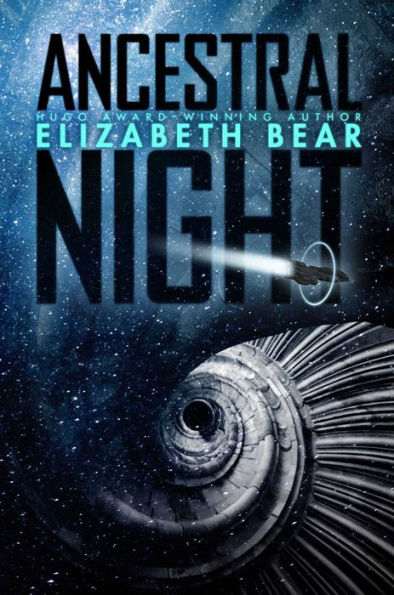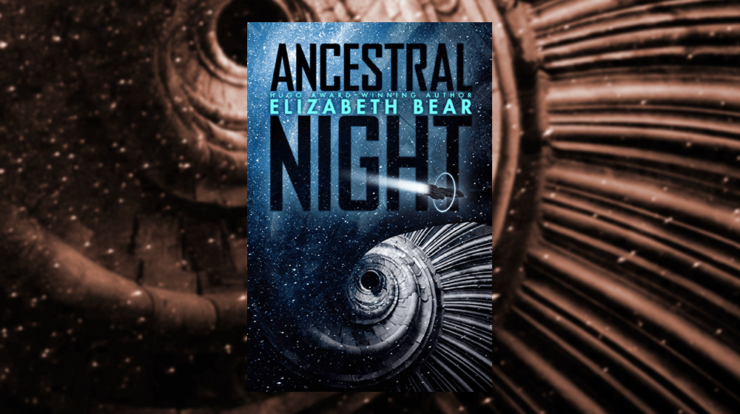Haimey Dz is a salvage tug operator with a small crew—Connla the pilot, Singer the shipmind AI, and two cats—who stumbles onto astounding ancient technology and the evidence of a monstrous crime during the recovery of a wrecked ship at the edges of inhabited space. Pirates, corrupt outpost officials, and an ever-tightening web of old secrets lead to a chase across the vast expanse of space where Haimey’s life as well as the current galactic social order hang in the balance.
Ancestral Night is the first of the White Space novels, set amongst the worlds of the Jacob’s Ladder trilogy but much, much further along in the timeline. The Synarche government, which links species, planets, and cultures under the aegis of rightminding and the agreement to function as much as possible toward a communal good, has held strong—though there are holdout pirates and excluded sentient species still acting outside its boundaries.
Bear’s most recent dive into science fiction, following several years of primarily epic-fantasy novels, approaches time and space as grandiose concepts. Ancestral Night contains artifacts so old that no one has a sense of their origin or the specie(s) who created them and travel that spans from the supermassive black hole at the center of the galaxy to its uninhabited edges. It’s a big book: big objects, big ideas, big conflicts. There’s a distinct pleasure in that bigness, particularly considering Haimey’s meta-level grasp of narrative structure. Her observation that she wants to see herself as the protagonist of the occurrences surrounding her life bears fascinating fruit as the plot progresses, given that we at first take her and her team for comfy but small-time operators. However, Haimey’s sense of individual smallness is blown out of the water by the discovery of the abandoned alien ship containing the slaughtered remains of a sentient species—an event which pushes her into the spotlight as she first reports the crime and then finds herself chasing its trail when the authorities prove less than useful.
One of the main questions posed in Ancestral Night is what makes you you—what past traumas and loves and experiences have shaped your needs, the impossibility of core self. We’re all constructed texts. Haimey’s arc is in large part about coming to terms with the fact that being constructed out of mediated experiences is just… life, made more direct through the use of technological interventions both physical, like having afthands instead of feet for survival in low-gravity, and psychological, like the hardwiring that allows her to mediate her brain chemistry. The philosophical underpinning is familiar from queer critical theory: Just because it’s made up socially doesn’t mean it’s not real individually. That’s the most engaging argument in Ancestral Night on the micro scale. The concept of technological intervention to help revise the ugliest parts of our evolutionary imperative is, on one level, a metaphor for the process of education in critical thinking and self-management to function in a fully realized society. It’s hard work to look into oneself and think, that’s fucked up. I need to do better for the people around me and I want to do that work, even if my first instinct is self-serving.
On a macro level, Haimey and the pirate Zanya represent two radically different social value systems—one self-serving, one group-serving. The middle arc of the novel allows for a claustrophobic and direct ideological contrast via Haimey and Zanya on the Koregoi ship alone, hurtling through spacetime, hunting each other. The combination of self-knowledge (that the attraction Haimey feels to Zanya is maladaptive at best) and baseline desire (further complicated by Haimey’s trauma-based decision to turn off sexual interest at the root in her brain) ups the pair’s tension significantly. Some of the best bits of debate with Singer, too, revolve around coercion and compliance, the shifting line of individual versus collective and who gives up what for what reasons. As this book is set for the most part outside of society proper, literally in transit or transitional space, we don’t see much of the actual function of the Synarche or how resource allocation works. I’m intrigued to see later how the society Haimey is defending functions, where its flaws and fault-lines are.
The final third of the novel then expands the scope once more to tackle all the flash-bang conflict and massive, awe-inspiring technological objects a reader could ask for. Bear’s ability to construct gripping, complicated fights across wild domains is in full display in the climax. It’s breathtaking, retaining the human element that space battles sometimes lack. I also appreciated that one of my favorite characters ended up being a giant alien mantis; that’s great. Without providing too much detail, the confrontation at the close introduces several major players who will, I anticipate, play a significant role in the following novels while also closing off the narrative arc of this novel. It kept me riveted, that’s for sure.
Buy the Book


Ancestral Night
Ancestral Night does have its missteps, however. The main of these is a tendency to founder under repetition of concepts or observations that were crisp on first appearance but become belabored after multiple restatements. The notable repetitions are often small personal quips—for example, the description of Connla’s physique as a product of his origin culture, unappealing to Haimey but attractive to others, hits the same note over and over. The first time around it was informative and gave a sense of how different human cultures approached genetic manipulation and culture as well as Haimey’s sexuality. The second and third time, it did nothing new where something new could’ve been said. An idea is proposed, so to speak, but not explored. The end result, especially in terms of the scientific-philosophical-political points, was feeling as a reader that the pleasure I took in initially chewing over the concepts had been smothered under the restatement of the idea that first provoked so much interest. Give me more interrogation, less surface observation. Plus, that keenly-observed depth of character is a thing I’ve come to expect from Bear’s novels, which certainly also informs my critique in this case.
Despite that snag, I found the novel reasonably engaging and well-executed. It contains big objects and big ideas but predominantly skims their surfaces, giving enough complexity for an argument about social structures to evolve without chewing to the bone on those same concepts (though I do adore some good bone-chewing, in this metaphor). For a reader who is daunted by the brick-sized tomes of this sort of science fiction, Ancestral Night offers a potential starting point. It’s got a plot rich in dramatic action plus debates on politics while also encompassing the vast alienation of outer space on an emotional level. The awe of a supermassive black hole is contrasted with the awe of a found family; concepts of concession and equitable accommodation are explored alongside personal privilege and autonomy. I’m curious to see where future books in the series pick up, as Ancestral Night stands well enough on its own but leaves several doors open too. Overall, I’d say it’s a fair-to-decent novel—occasionally lacking in depth in terms of character and philosophical development but entertaining, set in a world I find intriguing and would appreciate seeing more of (and more done with) in the future.
Ancestral Night is available from Saga Press.
Lee Mandelo is a writer, critic, and editor whose primary fields of interest are speculative fiction and queer literature, especially when the two coincide. They have two books out, Beyond Binary: Genderqueer and Sexually Fluid Speculative Fiction and We Wuz Pushed: On Joanna Russ and Radical Truth-telling, and in the past have edited for publications like Strange Horizons Magazine. Other work has been featured in magazines such as Stone Telling, Clarkesworld, Apex, and Ideomancer.










